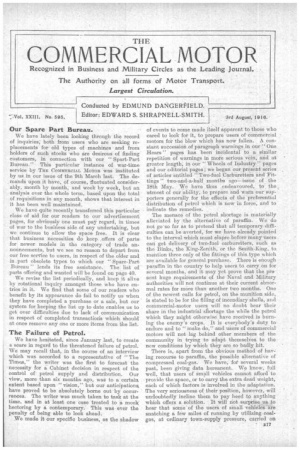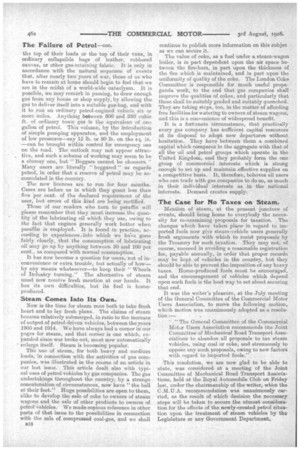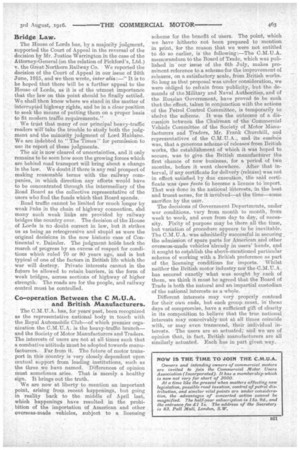Our Spare Part Bureau.
Page 1

Page 2

Page 3

If you've noticed an error in this article please click here to report it so we can fix it.
We have lately been looking through the record of inquiries; both from users who are seeking replacements for old types of machines and from holders of such stocks who are desirous of finding customers, in connection with our " Spart-Part Bureau." This particular instance of war-time service by THE COMMERCIAL MOTOR was instituted by us in our issue of the 9th March last. The demands upon it have, of course, fluctuated considerably, month by month, and week by week, but an analysis over the whole term, based upon the total of requisitions in any month, shows that interest in it has been well maintained.
We have quite recently transferred this particular class of aid for our readers to our advertisement pages, for obviously one must pay regard, in times of war to the business side of any undertaking, but we continue to allow the space free. It is clear that business necessities do keep ,offers of parts for newer models in the category of trade announcements, but we see no reason to depart from our free service to users, in respect of the older and in .part obsolete types. to which our "Spare-Part Btireau " lends its free assistance. The list of parts offering and wanted will be found on page 40.
We revise the list periodically, and keep it alive by rotational inquiry amongst those who have entries in it. We find that some of our readers who benefit by its appearance do fail to notify us when they have completed a purchase or a sale, but our system for keeping the list up to date enables us to get over difficulties due to lack of communication in respect of completed transaction's which should at once remove any one or more items from the list.
The Failure a Petrel.
We have hesitated, since January last, to create a scare in regard to the threatened failure of petrol. We may recall that, in the course of an interview which was accorded to a representative of "The Times," the writer was the first to forecast the necessity for a Cabinet decision in respect of the control of petrol supply and distribution. Our view, more than six months ago, was to a certain extent based upon "vision," but our anticipations, have proved to be absolutely borne out by occurrences. The writer was much taken to task at the time, and in at least one case treated to a mock. hectoring by a contemporary. This was ever the penalty of being able to look ahead.
We made it our specific business, as the shadow of events to come made .itself apparent to those who cared to look for it, to prepare users of commercial Motors for thd blow which has now fallen. A constant succession of paragraph warnings in our" One Hears" pages has been incidental to a similar repetition of warnings in mote serious vein, and at greater length; in our "Wheels of Industry '.' pages and our editorial pages; we began our present aeries of articles 'entitled " Two--fuel -Carburetters and Fittings" two-and-a-half, months ago—issue of the 18th May.. We have thus endeavoured,: to the utmost of our ability; to prepare and warn our sopporters generally for the effects of the preferential distribution of petrol which is now in force, and to indicate the remedies.
The menace of the petrol shortage is materially alleviated by the alternative of paraffin. We de not go-so far as to pretend that all temporary difficulties can be averted, for we have already pointed to the interval which must elapse before many users can get delivery of two-fuel carburetters, such as the Binks, the King-Zenith, or the Smith-King, to mention three only of the fittings of this type which are available for general purchase. There is enough paraffin in the country to help user'a to carry on for several months, and it may yet prove that the pre sent huge requirements of the Naval and Militaryauthorities will not continue at their current abnormal rates for more than another two months. One of the newest calls for petrol, on the munition side, is stated to be for the filling, of incendiary shells, and commercial-motor usera. will no doubt bear their share in the industrial stortage the while the petrol which they might otherwise have received is burning the enemy's crops. it is everybody's duty to endure and to "make do," and users Of commercial motors will not lag behind other members of the community in trying to adapt themselVes to the new conditions by which they are so badly hit.
There is, apart from the obvious method of hay-' ing recourse to paraffin, the possible alternative of compressed coal-gas: We have, for several weeks past, been giving data hereanent. We know, full well, that users of small vehicles cannot afford to provide the space, or to carry the extra dead weight, each of which factors is involved in the adaptation. The very seriousness of their position, however, will undoubtedly incline them to pay heed to anything which offers a abliition. • It Will not surprise us to hear that some 'of thd users 'of small vehicles' are snatching a few miles of running by utilizing coalgas, at ordinary town-supply pressure, carried on the top of their loads or the top of their vans, in ordinary collapsible bags . of leather, rubbered canvas, or other gas-retaining fabric. It is only in accordance with the natural sequence of events that, after nearly two years of war, those of us who have to remain at home should begin to feel that we are in the midst of a world-wide cataclysm. It is possible, we may remark in passing, to draw enough gas from any house or shop supply, by allowing the gas to deliver itself into a suitable gas-bag, and with it to run an ordinary petrol-engined vehicle six or more miles. Anything between 300 and 330 cubic ft. of ordinary town gas is the equivalent of one gallon of petrol. This volume; by the introduction of simple pumping apparatus, and the employment of low pressures---say 15 lb. or 30 lb. on the sa.
—can be brought within control for emergency use on the road. The outlook may not appear attrac , tive, and such a scheme of working may seem to be a clumsy one, but "Beggars cannot be choosers." Many users are. literally " beggared " as regards petrol, in order that a reserve of petrol may be accumulated in the country.
The new licences are to run for four months. Cases are before us in which they -grant less than five Per cent. of the declared requirement of the user, but errors of this kind are being rectified.
Those of our readers who turn to paraffin will please remember that-they must increase the quantity of the lubricating oil which they use, owing to the fact that engines generally work hotter when paraffin is employed. It is found in practice, according to experiences into which we have gone fairly closely, that the consumption of lubricating oil-rnay go up by anything between 50 and 100 per cent:, as compared with normal consumption. .
_ It has now become a question for users, not of inconvenience or extra trouble,but actually of how— by any means whatsoever—to keep their "Wheels of Industry turning." The alternative of steam must now receive fresh mention at OUT hands. It has tts own difficulties, but its fuel is homeproduced.
Steam Comes Into Its Own.
Now is the time for steam .men both to take fresh heart and to lay fresh plans. The claims of steam became relatively submerged, in ratio to the increase of output of petrol-driven vehicles, between the years 1905 and 1914. We have always had a corner in our pages for steam, and that corner is one which, expanded since war broke out, must now automatically enlarge itself. Steam is becoming popular.
TheUse of steam, for both heavy and medium loads, in connection with the activities of gas companies, was illustrated in the course of an article in our last issues. This article dealt also with typical uses of petrol vehicles by gas companies. The gas undertakings throughout the country, by a strange concatenation of circumstances, now have "the ball at their feet." Tinge possibilities are open to them, alike to develop the sale of coke to owners of steam wagons and the sale of other products to owners of petrol vehicles. We made copious reference in other parts of that issue to the possibilities in connection with the sale of compressed coal-gas, and we shall B18 continue to publish more information on this subjec as we can secure it.
The value of coke, as a fuel under a steam-wagon boiler, is in part dependent upon the air space be tween the fire-bars, in part upon the thickness of the fire which is maintained, and in part upon the uniformity of quality of the coke. The London Coke Committee is responsible for much useful propa ganda work, to the end that gas companies shall improve the qualities of cokes, and particularly that these shall be suitably graded and suitably quenched. They are taking steps, too, in the matter of affording free facilities for watering to owners of steam wagons, and this is a convenience of widespread benefit.
It is a fortunate circumstance, that practically every gas company has sufficient capital resources at its disposalto adopt new departures without• hesitation. They have between them a combined capital which compares in the aggregate with that of all the oil and petrol groups which operate in the United Kingdom, and they probably form the one group of commercial interests which is strong enough to set up and maintain effective supplies on a competitive basis. It, therefore, behoves all users who can trade with gas companies to do so, as much in their individual interests as in the national interests. Demand creates supply.
The Case for No Taxes on Steam.
Mention of steam, at the present juncture of events, should bring home to everybody the necessity for re-examining proposals for taxation. The changes which have taken placein regard to imported fuels now give steam-vehicle users generally fresh arguments with which to resist proposals by the Treasury for such taxation. They may not, of course, succeed in avoiding a reasonable registration fee, payable annually, in order that proper records ma Y be kept of vehicles in the country, but they should be able to prevent the imposition of any heavy taxes. Home-produced fuels must be encouraged, and the encouragement of vehicles which depend upon such fuels is the best way to set about securing that end.
It was the writer's pleasure, at the July meeting of the General Committee of the Commercial Motor Users Association, to move the following motion, which motion was unanimously adopted as a resolution:— " The General Committee of the Commercial Motor Users Association recommends the Joint Committee of Mechanical Road Transport Associations to abandon all proposals to tax steam vehicles, using coal or coke, and strenuously to oppose any such proposals, owing to new factors with regard to imported fuels."
This resolution, we are now glad to be able to state, was considered at a meeting of the Joint Committee of Mechanical Road. Transport Associations, held at the Royal Automobile Club on Friday last, under the chairmanship of the writer, when the C,M.U.A. recommendation was unanimously carried, as the result of which decision the necessary steps will be taken to secure the utmost consideration for the effects of the newly-created petrol situation upon the treatment of steam vehicles by the Legislature or. any Government Department,
Bridge Law.
• The House of Lords has, by a majority judgment, supported the Court of Appeal in the reversal of the decision by Mr. Justice Warrington in the case of the Attorney-General (on the relation of Pickford's, Ltd.) v. the Great Northern Railway Co. We reported the decision of the Court of Appeal in our issue of 24th June, 1915, and we then wrote, inter alia:—" It is to be hoped that there Will be a further appeal to the House of Lords, as it is of the utmost importanee that the law on this point should be finally settled. We shall then know where we stand in the matter of interrupted highway rights, and be in a clear position to seek the means of putting them on a proper basis to fit modern traffic requirements."
We trust that many of our principal heavy-traffic readers will take the trouble to study both the judgment and the minority judgment of Lord Haldane. We are indebted to "The Times" for permission to use its report of these judgments.
The air is now cleared of uncertainties, and it only remains to be seen how soon the growing forces which are behind road transport will bring about a change in the law. We doubt if there is any real prospect of making reasonable terms with the railway companies, in which direction any efforts would have to be concentrated through the intermediary of the Road Board as the collective representative of the users who find the funds which that Board spends. • Road traffic cannot be limited for much longer by weak links in the chain of highway connection, ahd many such weak links are provided by redlway bridges the country over. The decision of the House of Lords is no doubt correct in law, but it strikes us as being as retrogressive and stupid as were the original decisions in the now historic case of Continental v. Daimler. The judgment holds back the march of progress by an excess of respect for conditions which ruled 70 or 80 years ago, and is but typical of one of the factors in British life which the War will destroy. Private interests cannot in the future be allowed to retain barriers, in the form of weak bridges, across sections of highway of higher • strength: The roads are for the people, and railway control must be controlled.
Co-operation Between the C M.U.A. and British Manufacturers.
The C.M.U.A. has, for years past, been recognized as the representative national body in touch with the Royal Automobile Club—of which premier organization the C.M.U.A. is the heav-traffic. branch— and the Society of Motor Manufacturers and Traders. The interests of users are not at ail times such that a combative attitude Must be adopted towards manufacturers. Far from it. The future of motor transport in this country is 'very closely dependent upon mutual support from leading institutions, such as the three we have named. Differences of opinion Must sometimes arise. That is merely a healthy sign. It brings out the truth.
We are now at liberty to mention an important point, arising from recent happenings, but going in 'reality back to the middle of April last, which happenings have resulted in the prohibition of the importation of American and other overseas-made vehicles, subject to a licensing scheme for the benefit of users. The point, which we have hitherto not been prepared to mention in print, for the reason that we were not entitled to do so earlier, is the following :—The e.M.U.A. memorandum to the Board of TRide, which was published in our issue of the 6th July, makes prominent reference to a scheme for the improvement of releases, on a satisfactory scale, from British works. So long as that proposal was under consideration, we were obliged to refrain from publicity, but the demands of the Military and Naval Authorities, and of the Russian 'Government, have proved to be such that the effect, taken in conjunction with the actions of the Petrol Control Coinmittee, is temporarily to shelve the scheme. It was the outcome of a discussidn between the Chairman of the Commercial Vehicle Committee Of the Society of Motor Manufacturers and Traders, Mr. Frank Churchill, and representatives of the C.M.U.A., and its esse-nCe was, that a generous scheme of releaseS from British works, the establishment of which it was hoped to secure, was to give the British manufacturer the first chance of new business, for a period of two months, before it went elsewhere. After that interval, if any certificate for deli-very (release) was not in effect satisfied by dtie execution, the said certificate was ipso facto to become a licence to import. That was done in the national interests, in the best and truest sense, for it involved—at the time—some sacrifice by the user.
The decisions of Government Departments, under war conditions, vary from month to month, from week to week, and even from day to day, of necessity. Fixity of purpose may be there all the time, but variation of procedure appears to be inevitable. The C.M.U.A. was admittedly successful in securing the admission of spare parts for American and other overseas-made vehicles already in users' bands, and it sought to establish the aboviierrientioned particular scheme of working with a British preference as part of the, licensing conditions for imports. Whilst neither the British motor industry nor the-C.M.U.A. has secured exactly what was sought by eaeh of them, we think it must be agreed that the Board of Trade is both the natural and an impartial custodian of the national interests-as a whole.
Different interests may very, properly contend for their crivn ends, but each o'roup, must, in' these days of compromise, have a sufficient gift of charity in its composition to believe that the true national interests may conceivably not at all times coincide with, or may even transcend, their individual interests. The users are so actuated,' and we are of opinion that in fact, British manufacturers are all similarly actuated. Each haS in part given way.




















